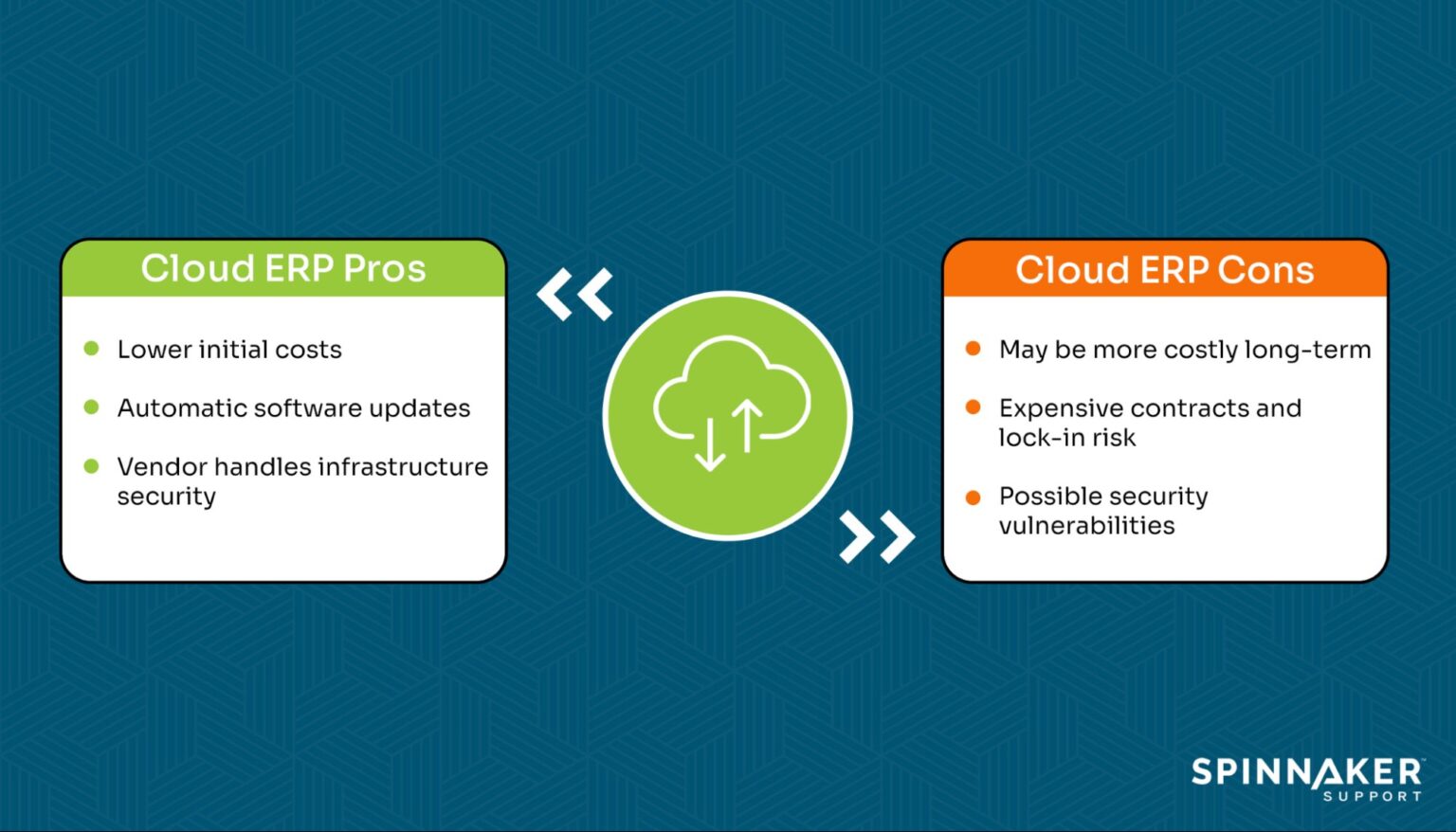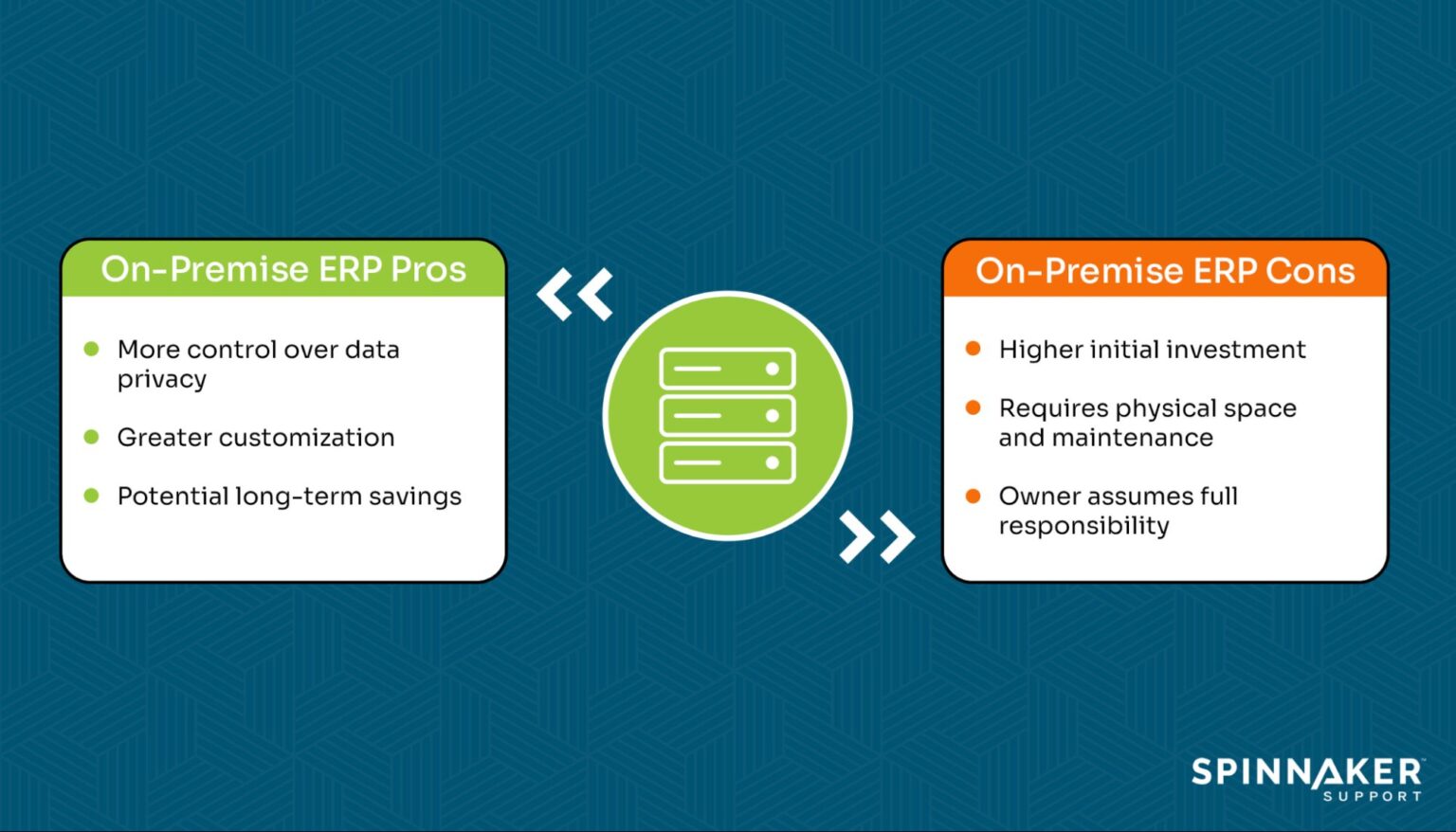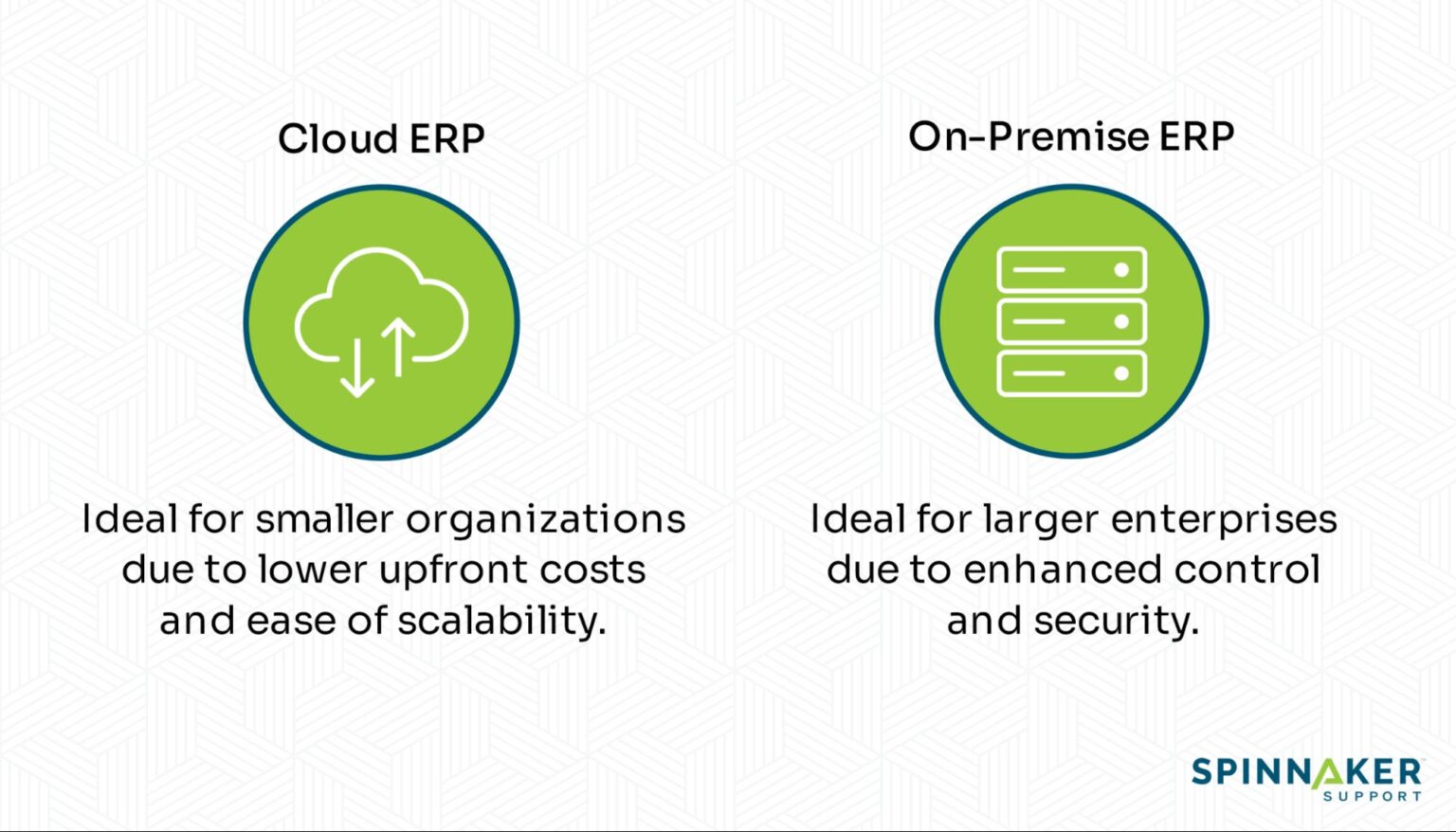Vendors today are increasingly pressuring businesses to abandon their legacy systems. They constantly advocate for newer, expensive solutions with costly first-party support.
This pressure has made the decision of migrating to cloud ERP or on-premise ERP a dilemma for many. Such a move is clouded by concerns over aligning with unique business needs, confusion over cloud migration plans, and looming security risks.
Yet, cloud ERP is pushing forward, with its market expected to surge to $274.1 billion by 2032. This growth is fueled by the demand for data-driven insights, placing companies at a crucial juncture where they grapple with the intricacy of transitions.
Faced with these challenges, how do you pick the right ERP system for your company? The answer lies in understanding the differences between cloud ERP and on-premise solutions.
Read on as we discuss these complexities to provide clarity and direction when you finally make the decision for your organization.
Cloud ERP vs on-premise: What’s the difference?
An Enterprise Resource Planning (ERP) system is a type of software that organizations use to manage and integrate important parts of their businesses. It combines various functions like accounting and human resources into a unified platform to streamline processes and information across the company.

There are two types of ERP systems: cloud ERP and on-premise ERP.
Cloud ERP is a type of ERP software that is hosted on a vendor’s infrastructure. These systems provide the flexibility and scalability that modern businesses need.
On-premise ERP solutions are systems that are installed and operated via a client’s in-house server. These systems are physically located within company spaces, providing enhanced control and customization to its users.
Cloud ERP systems are typically offered as Software as a Service (SaaS). These solutions involve a recurring subscription fee and are managed by the provider.
Meanwhile, on-premise ERPs require clients to invest in both hardware and software licenses. Organizations that choose this type of ERP are responsible for the system’s maintenance, updates, and overall management.
A few examples of cloud ERP systems are JD Edwards EnterpriseOne and Oracle ERP Cloud. Popular on-premise ERP platforms include SAP Business One and Microsoft Dynamics 365 Business Central.
What are the advantages and disadvantages of choosing a cloud-based ERP?
Cloud-based ERP systems offer a mix of advantages and disadvantages that businesses must carefully consider.

Let’s take a look at the pros and cons of this technology to better understand its impact on business operations.
Cloud ERP advantages
The following are the main advantages of cloud ERP systems.
Reduced costs
Cloud-based ERP systems are often favored for their cost-efficiency, particularly when it comes to initial investment. Unlike others, these solutions operate on a subscription-based model requiring substantial hardware and software procurement capital.
This structure transforms large upfront expenses into more manageable, predictable monthly or annual payments. Businesses that choose to go the cloud ERP migration route can significantly lower the barrier to accessing advanced ERP capabilities.
Simplified software updates
One of the hallmark features of cloud-based ERP systems is their ability to stay current through automatic software updates. The vendor typically manages and deploys these updates to ensure that companies always have access to the latest features.
This aspect of cloud platform systems relieves internal IT staff from the cumbersome task of manual updates. Organizations can also benefit from enhanced efficiency and reduced downtime, as updates are often carried out with minimal disruption.
Managed infrastructure security
The responsibility for infrastructure security in cloud ERP largely falls on the vendor. This is a significant advantage for many organizations, as it offloads a considerable burden of ensuring data safety and system security.
Cloud ERP vendors invest heavily in robust security measures, including advanced encryption, firewalls, and regular security audits to protect client data. This level of security might be challenging for individual businesses to do on their own.
Cloud ERP disadvantages
Below are the main disadvantages of cloud ERP systems.
Increased long-term cost
While cloud-based ERP systems present an attractive low initial cost, businesses must be cognizant of their potential long-term financial implications. Such platforms usually operate on a subscription-based model, which can lead to higher cumulative costs over an extended period.
This aspect is particularly significant for organizations that plan to use these systems over many years. The ongoing expenses, which may include regular updates, support services, and additional features, can accumulate, making the total cost of ownership higher than initially anticipated.
Heightened contractual and lock-in risks
Another consideration for businesses exploring cloud-based ERP solutions is the nature of the contracts and the risk of vendor lock-in. These contracts can be complex and often entail long-term commitments that may not always align with the evolving needs of a business.
The result is that businesses are finding themselves tethered to a single provider with limited flexibility. This dilemma has led many to choose a composable ERP approach, which offers more agility compared to on-premise ERP platforms.
Possible security vulnerabilities
Security remains a paramount concern with cloud-based ERP systems. The very nature of cloud computing, where data is stored and processed off-site, introduces potential vulnerabilities despite robust security measures.
However, it’s important to note that the infrastructure security managed by cloud ERP vendors significantly mitigates these risks. Their investments in advanced encryption, firewalls, and regular security audits are critical measures that help protect against cyber threats.
What are the advantages and disadvantages of choosing an on-premise ERP?
Similar to cloud-based ERP, on-premise ERP systems present a range of advantages and disadvantages that are crucial for businesses to assess.

Consider the pros and cons of this traditional approach to enterprise resource planning below.
On-premise ERP advantages
The following are the main advantages of on-premise ERP systems.
Increased control over data privacy
Managing data privacy is a top priority for many organizations, particularly those operating under strict compliance mandates. Local hosting of data offers a significant advantage, as it aligns with data sovereignty requirements.
This approach is essential for businesses that must adhere to specific regulations, ensuring their operations remain compliant and secure. Keeping data on local servers gives these organizations direct oversight and control over sensitive information.
Enhanced customization
Customization is key for businesses looking to tailor the different types of ERP systems to their unique operational needs. The flexibility to modify and adapt the system offers a distinct advantage, especially for companies with specialized processes or those operating in niche markets.
Such customization allows for a more personalized solution that allows organizations to improve their operations and workflows. The ability to fine-tune the system to specific business requirements can lead to enhanced efficiency and a better alignment with the company’s strategic objectives.
Improved long-term savings
Although the initial investment in on-premise ERP hardware and infrastructure may be substantial, this can translate into cost savings over time. The absence of recurring subscription fees, commonly associated with cloud-based solutions, plays a significant role in this case.
Additionally, the ability to manage and maintain the system internally can result in reduced dependency on external vendors, leading to cost efficiencies. For organizations with the capacity to support these systems, the long-term financial benefits can be a compelling argument in favor of this approach.
On-premise ERP disadvantages
Below are the main disadvantages of on-premise ERP systems.
Heightened initial investment
Implementing an ERP solution often involves a significant upfront expenditure. This cost is not just limited to the purchase of the software but extends to the required hardware infrastructure as well.
Additionally, businesses need to consider the expenses related to installation, customization, and integration with existing systems. This substantial initial investment can be a critical consideration, especially for small to medium-sized enterprises that may have limited capital resources.
Increased space and maintenance requirements
The deployment of these systems necessitates dedicated physical space to house the necessary servers and other hardware. This requirement poses a challenge, particularly for organizations with limited office space.
Besides space, there’s also the need for ongoing maintenance. This includes the physical upkeep of the hardware and ensuring that the software is regularly updated and secured against potential cyber threats. Such maintenance demands continuous attention and resources, which can be taxing for businesses.
Increased responsibility
With the adoption of such systems, the onus of managing and maintaining the entire infrastructure falls squarely on the shoulders of the business. This responsibility involves dealing with technical issues, ensuring data security, and managing software updates.
The need for in-house expertise or external consultants to handle these tasks adds another layer of complexity and potential cost. Moreover, the business will be responsible for addressing challenges such as data breaches, system issues, or any ERP implementation failures.
Cloud ERP vs on-premise: Which one is right for your company?
With the advent of cloud technology, companies are often caught in a dilemma: should they go for a cloud-based ERP solution or stick to a traditional on-premise system? The answer significantly depends on factors like company size, budget, and specific business needs.

While cloud ERP systems are often touted as universally superior, it’s important to approach such claims with a healthy level of skepticism. For example, instances where vendors like SAP might push for transitions to cloud solutions like S/4HANA may not always align with every business’s interests. Let’s delve into the specifics of both options to help you make a more informed decision.
Cloud ERP: Ideal for smaller organizations
Cloud-based ERP platforms are hosted on the vendor’s servers and accessed via the Internet. This model is particularly beneficial for smaller organizations due to its lower upfront costs and ease of scalability.
- Cost-effective: With no need for hefty initial investments in hardware and infrastructure, cloud ERP provides a more financially accessible option for small to medium-sized enterprises (SMEs).
- Scalability: As your business grows, cloud ERP systems can quickly scale up, accommodating more users and increasing functionality without significant infrastructure changes.
- Ease of maintenance: The vendor is responsible for updates, security, and maintenance, reducing the need for a large in-house IT team.
On-premise ERP: Suited for larger enterprises
On-premise ERP systems are set up locally on an organization’s own computers and servers. This traditional model offers enhanced control and security that makes it a preferred choice for larger companies.
- Control: Having the ERP system on-premise allows for greater control over the IT environment.
- Security: For businesses handling highly sensitive data, on-premise ERP offers the advantage of keeping all data in-house under company-controlled security protocols.
- Customization: Larger enterprises often have complex processes that require more tailored ERP solutions, which is more feasible with an on-premise system.
Making the right choice
Consider the following when deciding between cloud and on-premise ERP.
- Company size and growth trajectory: Smaller, growing companies may find the scalability and cost-effectiveness of cloud ERP more beneficial. Larger organizations might value the control and customization offered by on-premise solutions.
- Budget constraints: Assess your financial capacity for upfront investments versus a preference for a subscription-based payment model.
- Business processes and data sensitivity: Evaluate the complexity of your business processes and the sensitivity of the data you handle.
While cloud ERP solutions offer compelling benefits for smaller businesses, larger enterprises might find greater value in the control and security of on-premise systems. Remember, the decision should be based on your unique business needs and not solely on vendor claims or market trends.
Regardless of your choice, partnering with Spinnaker Support provides a valuable safety net. We offer expert third-party support for maintaining legacy on-premise ERPs and deliver comprehensive assistance during and after a cloud migration.
Making the right ERP choice
Whether considering your first ERP system or contemplating a switch, deciding between cloud-based and on-premise ERPs is crucial. It requires thoroughly evaluating specific needs, budgets, and long-term objectives.
Businesses should also approach vendor claims with skepticism and focus on what’s truly best for their unique requirements.
At Spinnaker Support, we provide expert third-party support for businesses in either scenario. We provide exceptional guidance in maintaining current systems and invaluable assistance during and after transitions. Contact us today to get started!


